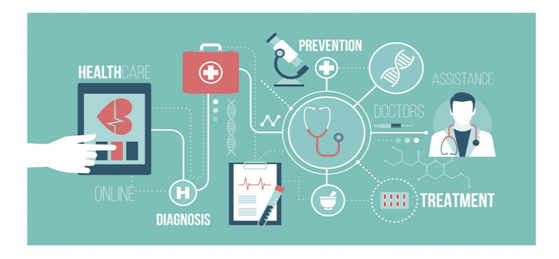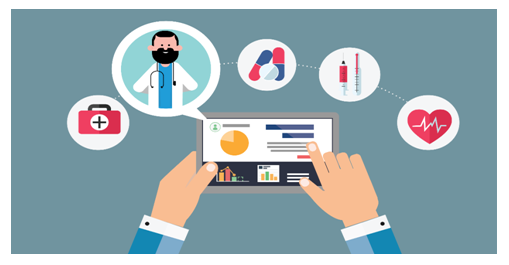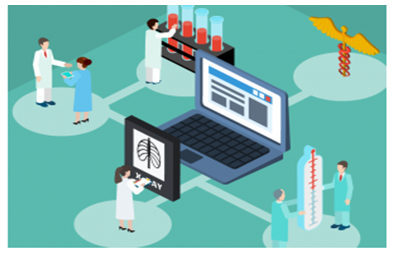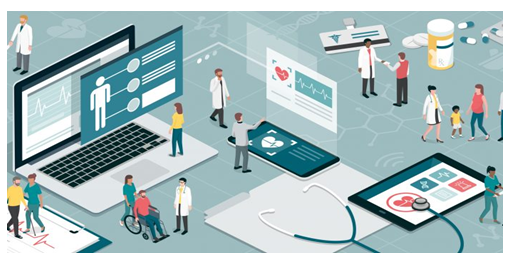EHR PROJECT IMPLEMENTATION
电子病历项目代写 With the advent of the 21st century, the advancements in the latest cutting-edge technologies are ever thriving. Technology…
The Need for the Adoption and Implementation of EHR System
With the advent of the 21st century, the advancements in the latest cutting-edge technologies are ever thriving. Technology has not only facilitated business, educational, and production industries but it has revolutionized the working mechanism of healthcare industries as well. EHR is one such magnificent advancement of technology that is offering a wide range of lucrative advantages to the health care industry. Several healthcare industries have adopted this technology to get several benefits while dealing and managing patients.

Figure 1
EHR is a commendable technology that is assisting doctors as well as patients by offering improvisations in various tasks. Doctors can manage, and control the records of their patients, can get help in prescribing the medicines which also called e-prescription and in addition to that they can also diagnose the disease with the help of this technology and get assistance in the treatment plan as well (Freriks, 2014). As the technology allows great portability in data and information this can help the doctor in sharing the patient record with other doctors to get a wider perspective. EHR is not only portable it also allows the doctor to work in a time-efficient manner with a minimal amount of errors.
Why Older Generation Clinicians Resist the adoption of EHR Systems? 电子病历项目代写
The older generation clinicians are not as technically oriented as the 21st-century doctors, because they have gained expertise in the medical field by implementing and practicing traditional methods of dealing with patients. They are not as tech-savvy as they need to be because the time demands to adopt and use more technical methods in the daily medical tasks that they encounter. The older generation of doctors doesn’t have ample familiarity with digital applications, Artificial intelligence simulations, and numerous other technological devices that are being operated in various medical industries. They trivialize the lucrative expediencies of the latest technologies because they have little to no knowledge about the execution of the latest technological devices. Due to this, they resist the adoption and implementation of EHR systems as they are not fully aware of the working mechanism of such systems and also, they are not adaptable enough to learn the enforcement of these technologies.

Figure 2
IT devices such as Artificial Intelligence, IoT, EHR systems have cultivated great productivity and expediencies pertinent to the medical fields, these avant-garde technologies have provided ease not only to the doctors in treating the patients but also to the patients by keeping them updated about their health recovery and medical history (EW & Grove D, 2016). Unbeknown to the former generation doctors, the official implementation of the forefront technology of electronic health record has not only provided ease in the diagnosis process but also accords with the screening of various diseases and display promising medications and treatments for the patients with great efficacy.
Utilities of EHR System over Paper-based system

Figure 3
Gone are the days, when medical industries use to deal with the data and information of the patient in a paper-based format, now with the successful implementation of the EHR systems the doctors can effectively manage, access and utilize the patient’s history in a blink of an eye, with just one click. This provides the doctors full control over the patient’s medical information at the time of his treatment or daily check-ups and after successfully analyzing that information the doctor can devise adequate methods for his treatment. Doctors are now able to devise a digital prescription to the patients with the assistance of the electronic health record systems.
The electronic health record system carefully analyzes the patient’s history and medical treatments and all that is necessary and after carefully assessing every detail it provides an appropriate treatment plan and medical prescription to the patients (DiAngi et al., 2019). As compared to the paper-based setups, the doctors can now save a lot of time along with the reduction in the rate of errors and complications. Electronic health record system provides doctors with the approach to work conveniently with great competency.

Figure 4
Electronic health record along with the other facilitations also assists the patients and increase the patient engagement also by providing them access to the online medical portals, where they can access their medical histories, medical and treatment plans and other activities which give them full control over their medical treatments.
As electronic health record system provides a plethora of advantages to the patients as well as doctors, this successfully promotes the implementation and justifies the reasoning behind the utilization of an electronic health record system.
Technical Skills Required by the Clinicians for the implementation of the EHR System 电子病历项目代写
For the execution of the electronic health record system, the clinicians must need to develop in them the appropriate set of technical skills that will help them in utilizing and implementing the applications and software of electronic health record system more conveniently. The clinicians need to be trained in such a way that they know how to access and control the data and information, execute the software, utilize the applications and get the results and images of the patients record all through electronic health record systems (McAlearney et al., 2012). Following are some of the technical competencies that are the need of the hour and they should be demonstrated by the doctors and clinicians:
-
Computer and Software Usage Skills
The clinicians must have sufficient knowledge about technology and computers and they should know about the integration of various systems, this will allow them to practice or access anything with the help of computers. The clinicians must also have ample knowledge about the medical software and they must be aware of the various concepts and aspects related to the medical software so that they can utilize it to get different images, results, and diagnoses of diseases.
-
Typing and Data Entry and Adequate Excel Skills 电子病历项目代写
The clinicians must be adequate expertise in typing and data entry of various patient records, they must know how to edit or generate medical reports for the patients through different software. They should have ample familiarity with all the applications of Microsoft. The clinicians must also be aware of the working of excel and how to enter data and generate plans through it.
-
Workflow Fluency
The clinicians must handle all the workflow with great efficacy and they should be able to automate and execute different medical processes, where different tasks, reports, information, and processes are shared with other doctors and medical organizations, for action as set according to the policies and procedures. They should be aware of the functions of EHR and how to use it to share information with other doctors to receive their perspective on critical situations.
-
Multi-tasking 电子病历项目代写
The clinicians should be able to multi-task in all situations, this will allow them to cope up with the critical situations. The doctors should be able to use technology to perform various tasks at once.
-
Data Analytics for Coding
The most substantial technical skill that should be demonstrated b all the clinicians is data analytics, the doctors should be able to configure, and analyze raw data and then should devise productive results based on the information. They should also be familiar with various medical algorithms and flowcharts.
-
Knowledge about the Digital Applications
To successfully implement EHR systems the clinicians should be well aware of the usage of the digital applications, such as online portals which will allow them to successfully update, modify and extract information and records related to different patients (Noblin et al., 2013).
-
Execution and Configuration of EHR systems 电子病历项目代写
The clinicians should have appropriate training to execute and configure the electronic health record systems, they should be fully aware of the complications and benefits of the systems and they should know how to properly execute it to get the productive outcomes. They should be able to get images and screening of diseases and should be able to prescribe treatments and medications through it, and they should also be able to access a patient’s medical history (Schumaker & Reganti, 2014).
-
Database Concepts Related to Healthcare
The clinicians should also have an understanding of the databases related to healthcare. They should know the database and infrastructure of various IT technologies that are needed in healthcare industries. They should also be able to extract and analyze these healthcare databases.
References 电子病历项目代写
DiAngi, Y., Stevens, L., Halpern – Felsher, B., Pageler, N., & Lee, T. (2019). Electronic health record (EHR) training program identifies a new tool to quantify the EHR time burden and improves providers’ perceived control over their workload in the EHR. JAMIA Open, 2(2), 222-230. https://doi.org/10.1093/jamiaopen/ooz003
EW, J., & Grove D, H. (2016). Physician Opinions about EHR Use by EHR Experience and by Whether the Practice had optimized its EHR Use. Journal Of Health & Medical Informatics, 7(4). https://doi.org/10.4172/2157-7420.1000240
Freriks, G. (2014). EHR Systems – Future Developments. SSRN Electronic Journal. https://doi.org/10.2139/ssrn.2458016
McAlearney, A., Robbins, J., Kowalczyk, N., Chisolm, D., & Song, P. (2012). The Role of Cognitive and Learning Theories in Supporting Successful EHR System Implementation Training. Medical Care Research And Review, 69(3), 294-315. https://doi.org/10.1177/1077558711436348
Noblin, A., Cortelyou-Ward, K., Cantiello, J., Breyer, T., Oliveira, L., & Dangiolo, M. et al. (2013). EHR Implementation in a New Clinic: A Case Study of Clinician Perceptions. Journal Of Medical Systems, 37(4). https://doi.org/10.1007/s10916-013-9955-2
Schumaker, R., & Reganti, K. (2014). Implementation of Electronic Health Record (EHR) System in the Healthcare Industry. International Journal Of Privacy And Health Information Management, 2(2), 57-71. https://doi.org/10.4018/ijphim.2014070104



